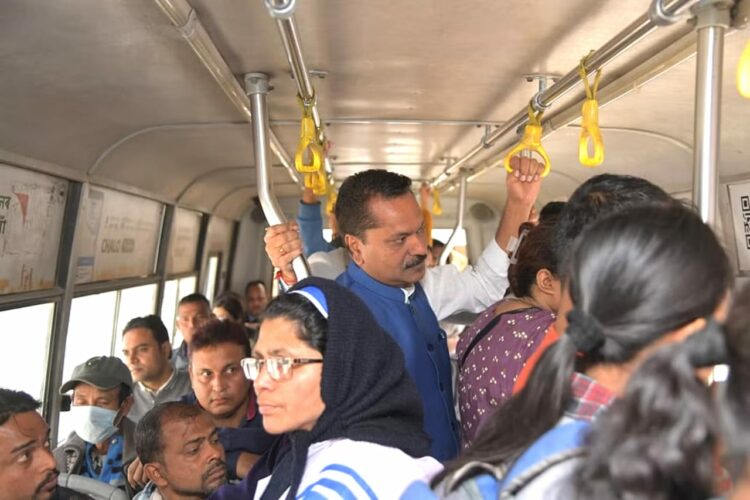When a senior minister in Himanta Biswa Sarma’s cabinet took a ride in city buses of Guwahati to understand the problems of daily commuters, it made the news.
During the State Urban Affairs Minister Ashok Singhal’s visit, he might have observed a lot of difficulties faced by the elderly, along with the women and children, while riding in those buses. Regularity and reliability of city buses, comfortability of passengers (precisely the ladies), the behaviour of the bus drivers, conductors and handymen (who are fond of abusive language during duty hours), cleanliness of the vehicles, etc might have been observed by the Minister. Moreover, it is hoped that he would pursue with the concerned authorities to resolve most of the issues.
Guwahati presently has over 15 lakh permanent residents, and a sizable number of city dwellers depend on city buses for daily work. Nearly 650 buses (over 500 owned by individuals) ply the streets of Guwahati.
Assam State Transport Corporation (ASTC) runs around 100 city buses across the gateway to northeast India. For records, ASTC (constituted under Road Transport Corporation Act 1950 with effect from 31 March 1970) operates nearly 1100 buses (including over 600 luxury ones) for destinations of long distances.
A large number of privately owned buses (over 1200) are also used under the ASTC operation. The corporation assures a reliable, safe and comfortable journey to the passengers. Besides covering rural areas inside Assam, the ASTC buses also reach important locations in various neighbouring States.
Appreciating State Minister Singhal for taking the initiative, a forum of nationalist citizens urged him to focus on the city’s quality night bus service. Patriotic People’s Front Assam (PPFA) also lauded the statement of Singhal where he was supposed to maintain a consistent effort to streamline connectivity in Guwahati under the guidance of State chief minister Himanta Biswa Sarma, who recently flagged off 100 new compressed natural gas run city buses.
The PPFA said in a statement, “Question that arises, why the State government in general and transport department in particular can not ensure regular (and timely) city bus service after the dusk as the law & order situation has improved in the last few years. Why the Guwahatians can not enjoy a city bus ride after 9 pm on various routes? How long do they have to wait for a consistent bus service till midnight ? If the private owners are immediately not ready to operate during night hours, why not the department run their own buses?”
The forum also requested the CMO to engage someone at the Chandmari point to observe if there are sufficient buses towards Guwahati Club after 8 pm. When thousands of enthusiasts were visiting Assam Book Fair at AEI filed (December 29 to January 9), and most of them depended on public transport, it questioned whether the concerned department had to ensure quality night city bus services towards various destinations.
Officially the city buses ply on various routes like Khanapara to Jalukbari, ISBT to Paltanbazar via Nepali Mandir, ISBT to Kachari via Datalpara, Basistha Chariali to Guwahati University via NH 37, Khanapara to Kachari via Ganeshguri Flyover, Chandrapur to Guwahati Club via Noonmati, Khanapara to Jalukbari via NH 37, ISBT to Paltanbazar via Lalganesh, Kahilipara to Amingaon via Chandmari, Notboma to Amingaon via Chandmari, Chandrapur to Dharapur Chariali vis Paltan Bazar, Basistha Mandir to Adabari via Chandmari, Basistha Mandir to Adabari via Paltan Bazar, Narangi to Khanamukh via Chandmari, Panjabari to Adabari via Chandmari, Adabari to Hajo, Adabari to Sualkuchi, Chaygaon to Adabari, Khanapara to Khetri, Bornihat to Jalukbari, etc.
Guwahati is developing as a major city in the eastern part and waiting to connect with many south Asian nations, including Bangladesh, Myanmar, Thailand, etc. The city should be active till late night hours. Hundreds of young people work in different commercial establishments, including shopping malls, restaurants, hospitals, media houses, etc, till the night hours, and they can not afford private vehicle services. Moreover, once the decent night bus service is in place, all kinds of commuters can plan their evening activities accordingly. And the positive changes should happen fast.




















Comments